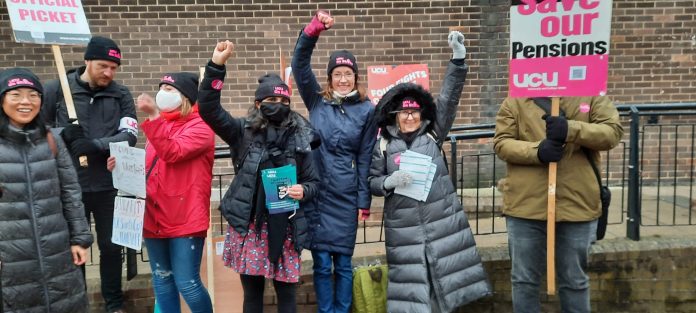Bea Gardner, UCU member
Over 70,000 staff at 150 universities will walk out as part of two separate disputes over pay, conditions and pensions. Up to two million university students will be affected by the action.
As well as walking out on 24 and 25 November, university staff have also begun action short of strike. This means only carrying out contractual duties, and not rescheduling cancelled classes.
A national demonstration to coincide with a third day of action on 30 November is organised, which we say should bring together all striking workers, along with everyone else fighting the cost-of-living crisis, including students.
As part of a strategy of escalating action, the next steps are a marking and assessment boycott to coincide with the winter exam period, followed by sustained strike action in the spring term, should the employers continue to refuse to negotiate with the union.
University workers have no choice but to fight. The determined mood to push back against exploitative working conditions, real-terms pay cuts and rife casualisation, plus relentless attacks to the USS pension, was clear from the impressive ballot result. The union broke through the 50% turnout threshold on a national basis for the first time.
Key now is a plan which translates this determined mood into an effective strategy of action that can deliver on aspects of the disputes.
The University and Colleges Union (UCU) leadership is leading with the slogan “the longer the picket, the shorter the strike”. It is true that a strong turnout, grinding universities to a halt across the country, will put the employers under significant pressure to negotiate.
A number of universities have already taken significant strike action over the same issues, on a disaggregated basis. Therefore, it is also necessary to prepare members for more sustained action if needed. As part of this, the leadership of the UCU should begin preparing coordination with other trade unions now, with the spring term holding the potential for education-wide walkouts, including teaching unions and others in the public sector.
The very issues at stake – low pay, insecure work and excessive workloads – can make taking action difficult. As well as a solid strike fund, discussion and coordination at every level will build confidence and help overcome obstacles. Rank-and-file participation needs to be built. Workplace meetings and picket rallies are vital spaces to thrash out the tactics of the strikes.
The unity that such a strategy would bring protects against attempts by the bosses to sow divisions. It would place us in a strong position to escalate the action, based on the maximum participation of members in a discussion of tactics.
If higher education continues to be led by pro-market senior managers, under the regulatory scrutiny of a hostile Tory government, any achievements made in these disputes will need to be defended.
Strong and effective ‘broad left’ organisation within the union is needed to ensure a fighting approach by the union is maintained and built.
We know that the marketisation of higher education has eroded our conditions at the cost of quality research and learning. Many members are drawing the conclusion that to solve the constant attacks we face, we need to go much further and turn the tide on marketisation.
A democratic left organisation could bring activists together to discuss and fight for the union to adopt a militant programme: against marketisation, for free education, and for the funding needed to run higher education as a public good.
To achieve that, we need a political as well as industrial strategy. Under the leadership of Jeremy Corbyn, Labour’s 2017 general election manifesto put forward free higher education. Under Keir Starmer, the Labour Party no longer campaigns for this, and has made it clear that it does not support workers getting a pay rise to keep up with the cost of living.
In the event of a general election, university workers need candidates prepared to fight in our corner for pay rises and in defence of our terms and conditions, and that fight for free, fully funded higher education. That means preparing now to put up a workers’ alternative to Labour at the ballot box, including UCU members as candidates alongside other trade unionists and working-class fighters.







